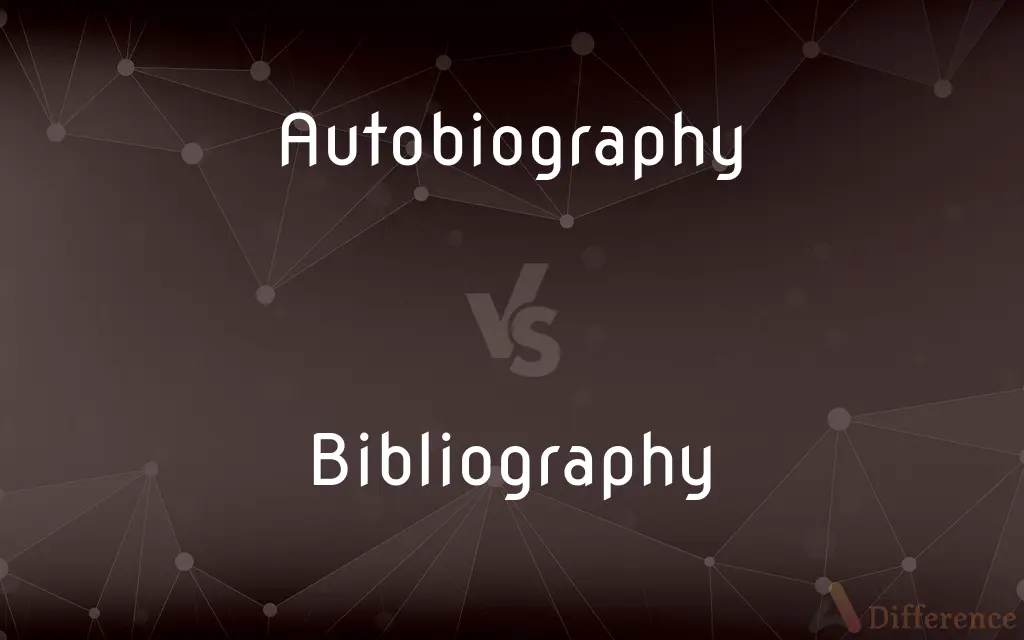Autobiography vs. Bibliography — What's the Difference?
By Urooj Arif & Maham Liaqat — Updated on March 20, 2024
An autobiography is a self-written account of the author's life, while a bibliography is a list of sources on a particular subject or by a specific author.

Difference Between Autobiography and Bibliography
Table of Contents
ADVERTISEMENT
Key Differences
An autobiography is a narrative where the author tells their own life story, often focusing on personal experiences, challenges, and achievements. In contrast, a bibliography is a comprehensive list of books, articles, and other resources related to a specific topic or authored by a particular individual, and it serves as a reference tool rather than a narrative.
While autobiographies provide insight into the author's thoughts, feelings, and perspectives on their life events, bibliographies offer a structured compilation of works that can be used for research, further reading, or academic purposes. Bibliographies are essential in scholarly work as they acknowledge sources and guide readers to additional information, whereas autobiographies aim to engage and inform readers about the author's personal journey.
Autobiographies are characterized by their first-person narration, giving readers an intimate look at the author's life from their own perspective. On the other hand, bibliographies are objective and factual, listing sources with details such as author names, titles, publication dates, and publishers, without providing personal commentary or narrative.
The purpose of an autobiography is often to share the author's life story with an audience, potentially offering inspiration, lessons, or insights based on personal experiences. Bibliographies, however, are created to document and organize sources related to a specific subject matter, facilitating research and exploration of the topic by others.
It's important to note that while both autobiographies and bibliographies are valuable literary tools, they serve distinct functions: autobiographies tell a personal story, while bibliographies provide a roadmap to a body of knowledge on a particular subject or by a specific author.
ADVERTISEMENT
Comparison Chart
Definition
A self-written account of one's own life.
A list of sources on a particular subject or by a specific author.
Purpose
To narrate the author's personal experiences, challenges, and achievements.
To provide a structured compilation of resources for research or further reading.
Perspective
First-person, reflecting the author's personal views and experiences.
Objective and factual, listing details without personal commentary.
Content
Personal stories, insights, and reflections.
Titles, authors, publication details of books, articles, and other resources.
Function
To engage, inform, and sometimes inspire readers with the author's life story.
To acknowledge sources, guide research, and facilitate further exploration of a topic.
Compare with Definitions
Autobiography
A personal narrative written by oneself about one's own life.
In her autobiography, she details her journey from poverty to success.
Bibliography
A list of books, articles, and other resources related to a specific topic or author.
The research paper concluded with an extensive bibliography on climate change.
Autobiography
Focuses on key events, experiences, and personal reflections of the author.
His autobiography offers insights into his private struggles and triumphs.
Bibliography
Organized systematically to provide easy access to source materials.
The bibliography was carefully organized alphabetically by the authors' last names.
Autobiography
Often aims to connect with readers on an emotional level, sharing life lessons.
The autobiography is filled with poignant moments and valuable life lessons.
Bibliography
Essential for academic and scholarly work to acknowledge sources.
His dissertation featured a comprehensive bibliography, citing all referenced works.
Autobiography
Can cover a wide range of themes, from professional achievements to personal anecdotes.
The scientist's autobiography delves into both her groundbreaking research and her personal life challenges.
Bibliography
Serves as a roadmap for further exploration of a subject or author's oeuvre.
The bibliography on Shakespearean literature guided students to key texts and criticisms.
Autobiography
Provides a unique, first-person perspective on the author's life.
The autobiography gives readers an intimate glimpse into the author's inner world.
Bibliography
Can be annotated, including brief summaries or evaluations of the listed works.
The annotated bibliography provided a summary of each source's main arguments.
Autobiography
An autobiography (from the Greek, αὐτός-autos self + βίος-bios life + γράφειν-graphein to write; also informally called an autobio) is a self-written account of one's life. The word "autobiography" was first used deprecatingly by William Taylor in 1797 in the English periodical The Monthly Review, when he suggested the word as a hybrid, but condemned it as "pedantic".
Bibliography
Bibliography (from Ancient Greek: βιβλίον, romanized: biblion, lit. 'book' and -γραφία, -graphía, 'writing'), as a discipline, is traditionally the academic study of books as physical, cultural objects; in this sense, it is also known as bibliology (from Ancient Greek: -λογία, romanized: -logía). English author and bibliographer John Carter describes bibliography as a word having two senses: one, a list of books for further study or of works consulted by an author (or enumerative bibliography); the other one, applicable for collectors, is "the study of books as physical objects" and "the systematic description of books as objects" (or descriptive bibliography).
Autobiography
The biography of a person written by that person.
Bibliography
A list of the works of a specific author or publisher.
Autobiography
(countable) A self-written biography; the story of one's own life.
Bibliography
A list of writings relating to a given subject
A bibliography of Latin American history.
Autobiography
(uncountable) Biographies of this kind regarded as a literary genre.
Bibliography
A list of writings used or considered by an author in preparing a particular work.
Autobiography
A biography written by the subject of it; memoirs of one's life written by one's self.
Bibliography
The description and identification of the editions, dates of issue, authorship, and typography of books or other written material.
Autobiography
A biography of yourself
Bibliography
A compilation of such information.
Bibliography
A section of a written work containing citations, not quotations, to all the books referred to in the work.
Bibliography
A list of books or documents relevant to a particular subject or author.
Bibliography
The study of the history of books in terms of their classification, printing and publication.
Bibliography
A history or description of books and manuscripts, with notices of the different editions, the times when they were printed, etc.
Bibliography
A list of books or other printed works having some common theme, such as topic, period, author, or publisher.
Bibliography
A list of the published (and sometimes unpublished) sources of information referred to in a scholarly discourse or other text, or used as reference materials for its preparation.
Bibliography
The branch of library science dealing with the history and classification of books and other published materials.
Bibliography
A list of writings with time and place of publication (such as the writings of a single author or the works referred to in preparing a document etc.)
Common Curiosities
How does a bibliography differ from an autobiography?
A bibliography is a list of sources related to a specific subject or author, used for reference, unlike an autobiography which is a narrative of the author's life.
What is the purpose of an autobiography?
The purpose of an autobiography is to share the author's life story, offering insights, lessons, and personal reflections to readers.
Why is a bibliography important in scholarly work?
A bibliography is crucial in scholarly work for acknowledging sources, guiding research, and providing a pathway for further exploration of a topic.
What is an autobiography?
An autobiography is a self-written account of the author's own life, focusing on personal experiences and reflections.
Is a bibliography always about books?
No, a bibliography can include books, articles, online resources, and other types of publications relevant to the topic or author.
What information is included for each entry in a bibliography?
Bibliography entries typically include the author's name, work title, publication date, and publisher information.
Can an autobiography be unbiased?
Autobiographies are inherently subjective due to their personal nature, but authors can strive for honesty and self-awareness in their narratives.
Do autobiographies follow a chronological order?
Many autobiographies follow a chronological order, but some may be organized thematically or use a non-linear narrative structure.
Can an autobiography include a bibliography?
Yes, an autobiography can include a bibliography, especially if it references other works or sources throughout the narrative.
Can autobiographies be considered as sources in a bibliography?
Yes, autobiographies can be listed in bibliographies as sources, especially in research concerning personal narratives or historical figures.
How is a bibliography organized?
Bibliographies are typically organized alphabetically by author's last name or by subject, depending on the format and purpose.
What makes an autobiography compelling to readers?
An autobiography is compelling when it offers honest reflections, engaging storytelling, and relatable or inspiring experiences.
What is the difference between a bibliography and a reference list?
A bibliography can include all works related to a topic, while a reference list specifically includes works cited or consulted directly in the research.
Are bibliographies only used in academic settings?
While commonly used in academia, bibliographies are also valuable in various professional and personal research contexts.
How does one cite an autobiography in a bibliography?
An autobiography is cited in a bibliography like any other book, following the specific citation style being used (e.g., APA, MLA).
Share Your Discovery

Previous Comparison
Masthead vs. Title
Next Comparison
Motif vs. MimeoAuthor Spotlight
Written by
Urooj ArifUrooj is a skilled content writer at Ask Difference, known for her exceptional ability to simplify complex topics into engaging and informative content. With a passion for research and a flair for clear, concise writing, she consistently delivers articles that resonate with our diverse audience.
Co-written by
Maham Liaqat













































